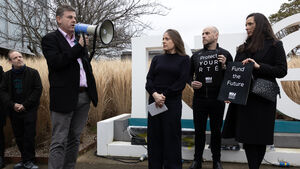RTÉ's real-life drama is a tired old episode

Kevin Bakhurst, the Director General of RTÉ, addresses staff members during their lunchtime picket at Montrose last Wednesday over the ongoing issues at the station.
Where is the remote control? It really is time to switch the channel. Enough, already. The RTÉ story is on repeat. Again and again it recurs. It has become a vampire story, impossible to kill off, rising from the seeming dead every few weeks.
The story has come, gone, come back again, gone, come back again. And who knows what is ahead in the ‘never ending crisis’, a crisis which ‘deepens’, providing us with ‘fresh twists’ around every corner. Are there other acts in this drama? How much attention should most people be paying?
There comes a point in any story where the substantial issues are well known, so it is largely the potential for drama and outrage which keep it in the headlines. RTÉ is no longer close to being the most important news, even on a slow news day. The return to focus on it every few weeks as the lead item is becoming simply odd, and the lack of proportionality is frankly absurd.
To say there are more important issues facing the country than RTÉ is an act of supererogation if ever there was one. We have a housing crisis; we have deficits in our health care; we have various international crises to contend with; many people cannot get timely access to vital social supports; and we have a society which is becoming increasingly divided on the issue of immigration. You might say – and, on some of them, you would be right – that these issues have been well discussed over the last six months.
But would you think that RTÉ and its governance failings and challenges are as big a deal as any of those? Does that mean RTÉ and its travails isn’t important? Of course not. But does anyone think it is as important as the amount of time given to it these last six months and more?
For too long now we have been fed headline news about whether and what the Minister was told by the Chairperson (how significant is that to anyone but the two of them?); or another report about whether Toy Show the Musical was properly assessed before it went into production (trust us, we’ve figured out by now that it wasn’t); or how terrible it was that the RTÉ commercial department sent flip-flops to paying advertising clients as a gift. We can all clutch our pearls in horror at that last one, but at the same time, have you ever heard of a business that didn’t send occasional gifts to their best paying customers? No, me neither. You know why? Because any business that doesn’t do that isn’t in business anymore. Businesses send gifts to clients at Christmas and throw summer parties for them and all sorts – these are some of the commercial and pragmatic realities of the real world.
There was more front-page focus on a wide range of matters again last week – and no doubt there will be again. It is not a question of whether these things are important or not, but whether they are the most important issues facing the nation – which is what you would have to assume from the coverage.
This a pattern now in the public reaction to anything, whereby issues of undoubted importance are all treated alike as matters of the gravest crisis. The difficulties in RTÉ are just the latest manifestation of that. Many think it is because there is a small cohort of people in our country who have a very dominant effect on what makes ‘news’ in Ireland. Most of those people are on Twitter (now called ‘X’) and they spend an almost unbelievable amount of time arguing with one another on this platform. If you have ever had the unedifying experience of watching any public question being debated there, you will know that you might as well let the matter be gently teased out in the ring of a professional wrestling match – for there you will see more wisdom and less aggression.
The ‘debate’ which ensues often makes it impossible to tell whether something is a mountain or a molehill or somewhere in between. Certainly trivialities can be transformed into existential matters, and a legitimate desire for accountability turns into strident demands for public shaming.
A low point in that whole process was seeing Simon Coveney being asked questions about his brother. The view of any person on this really shouldn’t be determined by whether you think Fine Gael is the saviour or the ruination of the country. Simon Coveney is not his brother’s keeper. He recused himself – stood away from decisions – at cabinet about RTÉ matters because of his family connection. That should be enough, and if it wasn’t, what more did people asking him those questions expect? If we now want our public figures to comment on or even have a go at family members to demonstrate their purity in the face of this new form of so-called accountability, it won’t be too long before the only people in public office are those least fitted for it.
And if, in the name of accountability, we want to set light to anyone who does things wrong or just makes a mistake, that can’t end well. Who would want to be upfront when they’ve made an error, if the reaction is always what we too often see on social and increasingly on traditional media? And for those politicians who play up to this stuff in order to get likes or popularity, here’s a tip – in the end it doesn’t work.
What happens to what is left of RTÉ when all this is over is important, but we have all heard enough about it now. We can all appreciate how this was a difficult story for the RTÉ newsroom. Report it too little and they would be denounced. And on a human level, any person can appreciate how RTÉ employees would feel annoyed about it all. But the story about RTÉ no longer deserves to lead the news on RTÉ – and it continuing to do so is only doing further damage to it and to the very important need for public service media and broadcasting in our country. For that reason (and for others) it no longer deserves to lead anything – and most of the public already know it.
You notice how this has been detected by the odd wise politician in Leinster House, whom you can hear distancing themselves from the story, or caveating when asked about it by saying ‘well of course there are more important issues’. They know that the voters are already ahead of those who think themselves opinion formers. The Taoiseach and Ministers and indeed all leading politicians of all parties would do well to note this. When next they are asked about RTÉ, they should say that it is a matter for RTÉ, for occasional meetings of the Media Committee in the Oireachtas, and for the relevant Minister. And then they should start talking about things that really matter, things that are mounting up, and the difficult choices we face about how to respond to them. That is what should be leading the news.





